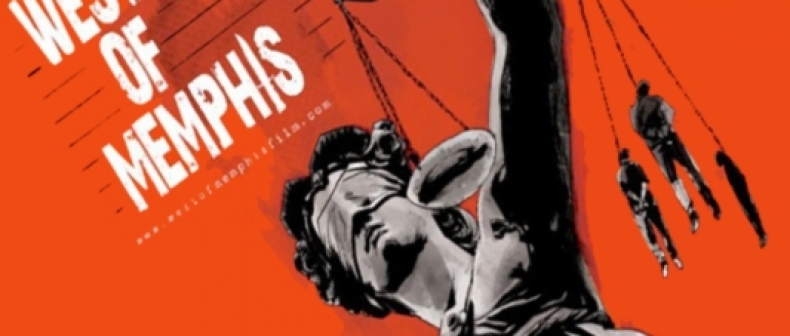
Collectively referred to as the West Memphis Three, Damian Echols, Jessie Miskelley and Jason Balwin are three men at the centre of what is generally coming to be acknowledged as one of the grosser miscarriages of justice in the U.S. criminal system. While still teenagers, the three young men were convicted of the murder of three boys in West Memphis, Arkansas; they were all sentenced to either life in prison or death, in the case of Damian Echols.
Over the years, as a growing body of evidence began to snowball that justice had not been served, several documentaries were made about their case. It became increasingly apparent that the three teenagers had been targeted by the police force because of their outsider status in the community, which included listening to heavy metal music. The prosecution had argued that the three murdered boys had been killed by the West Memphis Three as part of a satanic ritual as. As time passed, the role of hysteria and in their conviction became more and more apparent, but still the men were kept behind bars while their stories were occasionally revisited in the media.
In 2007, technology had advanced and new forensic evidence came to light; it would take until 2010 for the Supreme court to rule that new DNA evidence and earlier jury misconduct had to be considered by a lower court to see if it might exonerate the Three.
On August 19th of 2011, The West Memphis Three were finally released from prison. They had negotiated an unusual deal with prosecutors known as an Alford plea, which allowed they to assert their innocence while also acknowledging that the prosecution had enough evidence to convict them. This mean that they could be released immediately but that their names would not be cleared, nor could they ever pursue a wrongful imprisonment lawsuit.
The West Memphis Three have moved away from hoping that the U.S. Justice system will do right by them; instead, they strive for justice among the people, a platform and a voice through which to tell their story. Right now, they have two powerful pieces of media working for them: the new documentary, West of Memphis, written by Amy J. Berg and produced by Peter Jackson, and the accompanying soundtrack, West of Memphis: Voices for Justice. The soundtrack features a host of musicians, many of them long-time supporters of the Three, covering songs that were important to the three during their 18 years and 78 days in prison, as well as some original material composed by Nick Cave and Warren Ellis
Track Listing
- Henry Rollins (featuring Nick Cave & Warren Ellis original score), ‘Damien Echols Death Row Letter Year 9′
2. Natalie Maines, ‘Mother’
3. Lucinda Williams, ‘Joy’
4. Camp Freddy, ‘The Jean Genie’
5. Tonto’s Giant Nuts featuring Johnny Depp & Bruce Witkin, ‘Little Lion Man’
6. Marilyn Manson, ‘You’re So Vain’
7. Band of Horses, ‘Dumpster World’ (Live)
8. Citizen Cope, ‘DFW’
9. Eddie Vedder, ‘Satellite’
10. Bill Carter, ‘Anything Made of Paper’
11. The White Buffalo, ‘House of Pain’
12. Bob Dylan, ‘Ring Them Bells’
13. Nick Cave & Warren Ellis, ‘West of Memphis Score Suite’
14. Tonto’s Giant Nuts featuring Johnny Depp (featuring Nick Cave & Warren Ellis original score), ‘Damien Echols Death Row Letter Year 16′
15. Road To Nowhere Bill Carter (Digital Bonus Track)
16. Patti Smith — Wing (Recorded Live at Voices For Justice Benefit Concert — August 28, 2010) (Digital Bonus Track)
One of the most haunting moments on the soundtrack is the cover of “House of Pain” (originally by Faster Pussycat) by The White Buffalo. The acoustic rendition is full of deep longing, both in the subtle, plaintive guitar work and the faint, shivering strings in the background. There is regret, deep and thick, spilling over every note of the song.
Jake Smith of The White Buffalo explains that infusing a deep sense of loss into the song felt natural for him, given the nature of the project he was working on. “I don’t know why, but it’s easy for me to do the haunting thing and the sadness of that song is pretty prevalent,” Smith explains. He says that he chose the sing from a list that was presented to him, songs that Echols and the other men had identified as music that was important to them, that they were listening to shortly before their conviction. “A lot of the soundtrack is music that they, or at least Damian Echols, took into prison with him, so a lot of them are songs from ’92 and ’93 from before they went inside. These were songs that got them through the early years when there was no influx of new music coming to them. So they were listening to all this stuff before they went in, and then were stuck in this musical time capsule.”
As well as covers, and the film score itself, there is a searing spoken word number performed by Henry Rollins, who reads a letter that Damien Echols wrote to him in 2003. It is a frightened, unsure letter, but also a deeply powerful one; there is not doubt that, through all that they endured, Echols was able to keep his voice.
It is this fact, this endurance, that drew Jake Smith to the project and inspired his performance. “It’s pretty amazing that they came out even remotely sane, to be incarcerated for eighteen-nineteen years, it seems impossible that they could endure it,” noting that he is not sure he would have come out as whole. “It’s a test of their wills and mental strength.”
If there is anything that Smith hopes that the audience takes away from either the West of Memphis film or its soundtrack, it’s that, “it is their will and their strength that got them through it. That is what I want people to carry away from this. It touches me that they survived and came out of it intact.”
Smith also hopes for justice to be served for the West Memphis Three, though not necessarily in the courts. The justice these men will now receive may never be from the justice system, but through the art that is made out of their story. “Justice among the people is now what they are striving for,” Smith notes, and control over their own narrative at last.
West of Memphis opens in Toronto on February 1st. The soundtrack, West of Memphis: Voices for Justice, was released on January 15th and is available via Sony/Legacy Records.
____
Natalie Zina Walschots is a poet and music writer based in Toronto, Ontario. Her second book of poetry, DOOM: Love Poems for Supervillains, was published by Insomniac Press this spring. You can follow her on Twitter at @NatalieZed.
For more, follow us on Twitter at @torontostandard, and subscribe to our newsletter.














